We must all be alike fahrenheit 451 – We must all be alike, declares Fahrenheit 451, a chilling dystopian novel that explores the dangers of conformity and the importance of individuality. Set in a society where books are banned and independent thought is forbidden, the novel paints a vivid picture of the oppressive forces that seek to extinguish the human spirit.
In this haunting and prescient tale, Ray Bradbury warns of the perils of a society that values uniformity over diversity, and the profound consequences that arise when individuals dare to challenge the status quo.
Contextual Setting
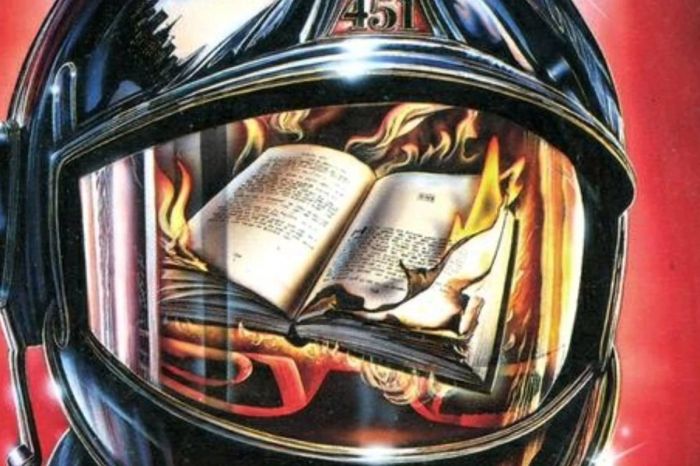
The quote “We must all be alike” holds profound significance in Ray Bradbury’s dystopian novel Fahrenheit 451. It encapsulates the oppressive and conformist ideology that pervades the totalitarian society depicted in the book.
Fahrenheit 451 presents a bleak and oppressive world where the government exercises absolute control over its citizens. Society is rigidly structured, with individuals expected to conform to a narrow set of norms and values. Dissent and individuality are ruthlessly suppressed.
The quote “We must all be alike” reflects this relentless drive towards uniformity and suppression of difference.
Government Control and Censorship
In the novel, the government maintains its control through a combination of strict laws, surveillance, and propaganda. Books are banned and burned, as they are seen as a threat to the government’s authority. The citizens are constantly monitored and any signs of nonconformity are swiftly punished.
The government’s censorship extends beyond books. It also controls the media, education, and all forms of communication. Citizens are only allowed to consume government-approved information, which reinforces the official narrative and discourages critical thinking.
The Role of the Firemen
One of the most striking symbols of the government’s oppressive control is the firemen. In this society, firemen are not responsible for extinguishing fires but rather for starting them. They burn books and homes of those suspected of dissent.
The firemen represent the government’s ruthless enforcement of conformity. They are a constant reminder of the consequences of noncompliance and serve to intimidate the citizens into submission.
The Impact on Society
The relentless pursuit of uniformity has a devastating impact on society. Individuals are stripped of their individuality and become mere cogs in the government’s machine. They are afraid to express their thoughts or feelings, as they fear being labeled as different or subversive.
The society in Fahrenheit 451 is a cautionary tale about the dangers of totalitarianism and the importance of preserving individuality and freedom of thought.
Conformity and Individuality: We Must All Be Alike Fahrenheit 451
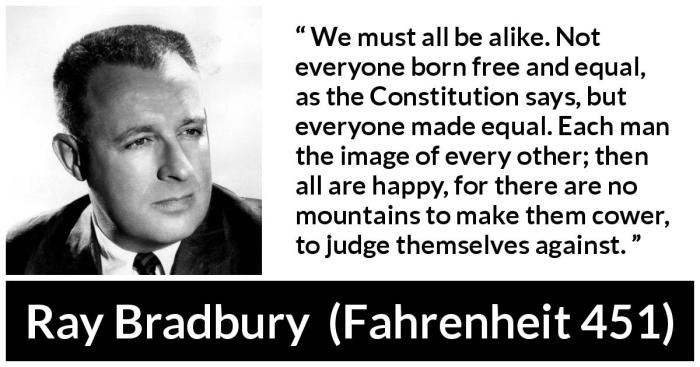
In the dystopian world of Fahrenheit 451, conformity is enforced through various mechanisms. The government, represented by the firemen, actively suppresses any form of individuality or deviation from societal norms. Books, considered a threat to the established order, are burned to prevent citizens from engaging with ideas that could challenge their beliefs.
Consequences of Nonconformity
Those who resist conformity face severe consequences. They are labeled as “deviants” and subjected to social isolation, surveillance, and even imprisonment. Montag, the protagonist, experiences firsthand the dangers of nonconformity when he questions the society’s values and starts to read forbidden books.
As a result, he becomes an outcast, hunted by the authorities.
Struggle for Individuality
Despite the oppressive environment, some individuals struggle to maintain their individuality. Montag’s encounter with Clarisse McClellan, a free-spirited and curious girl, awakens within him a desire for knowledge and a sense of dissatisfaction with the status quo. He joins a group of rebels who are determined to preserve books and promote critical thinking.
The Role of Technology
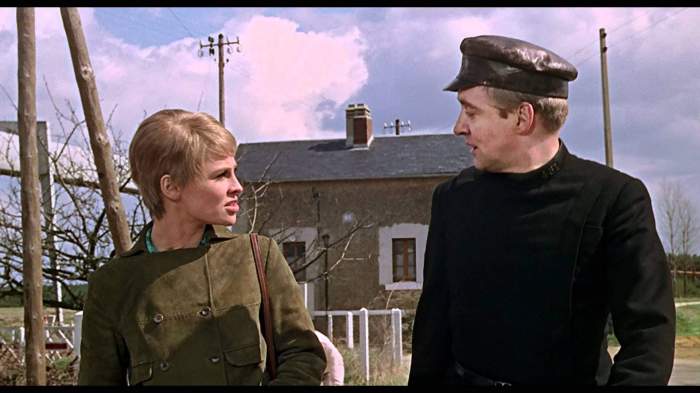
In Fahrenheit 451, technology plays a pivotal role in promoting conformity and suppressing individuality. The novel depicts a dystopian society where the government uses advanced technology to control its citizens and enforce strict adherence to societal norms.
The Mechanical Hound
The mechanical hound is a symbol of the oppressive nature of technology in Fahrenheit 451. This robotic creature is used by the firemen to track down and eliminate anyone who possesses or reads books, which are considered a threat to the government’s authority.
The hound’s unwavering obedience and ruthless efficiency represent the dehumanizing effects of technology when it is used to suppress dissent and individuality.
The Firemen, We must all be alike fahrenheit 451
The firemen in Fahrenheit 451 are another embodiment of the oppressive role of technology. While their primary duty is to burn books, they also serve as agents of the government, enforcing conformity and suppressing any form of independent thought or expression.
Their flamethrowers, which are used to incinerate books and destroy any trace of individuality, symbolize the destructive power of technology when it is wielded by those in power to control society.
Suppression of Individuality
Technology in Fahrenheit 451 is used to suppress individuality in a variety of ways. The government’s strict control over information and communication channels, including the media and the internet, prevents citizens from accessing alternative perspectives and developing their own unique thoughts and beliefs.
The constant surveillance and monitoring of citizens through advanced surveillance systems further stifles individuality, as people are constantly aware of being watched and judged.
The Power of Books
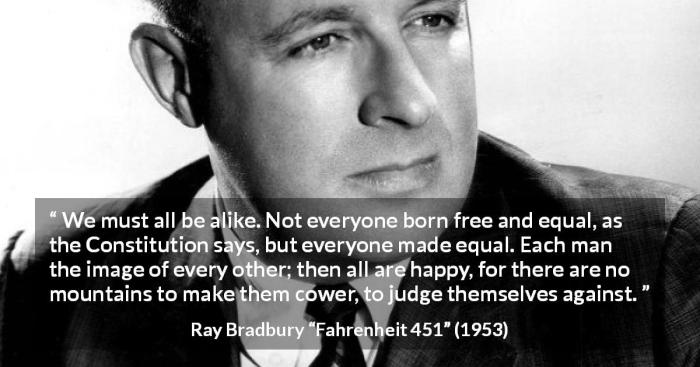
In Fahrenheit 451, books hold immense significance as symbols of individuality and resistance against conformity. They represent a source of knowledge, critical thinking, and imagination, providing characters with the tools to challenge the oppressive society they live in.
Books provide a gateway to knowledge and wisdom. They contain historical accounts, scientific discoveries, and literary works that expand the readers’ understanding of the world and its complexities. By accessing this knowledge, individuals can form informed opinions, question authority, and make independent decisions.
Critical Thinking and Imagination
Books foster critical thinking by encouraging readers to analyze information, evaluate arguments, and draw their own conclusions. They present different perspectives, challenge preconceived notions, and stimulate intellectual curiosity. Through critical engagement with books, individuals develop the ability to think for themselves, question the status quo, and resist indoctrination.
Moreover, books ignite the imagination and creativity. They transport readers to different worlds, introduce them to new characters and experiences, and expand their capacity for empathy. By engaging with imaginative works, individuals can develop a sense of wonder, appreciate the beauty of language, and connect with others through shared experiences.
Resistance and Identity
In the oppressive society depicted in Fahrenheit 451, books become a powerful tool of resistance against conformity. Characters like Montag and Faber use books to maintain their sense of self, connect with others who share their values, and challenge the government’s suppression of individuality.
By reading and discussing forbidden books, Montag and Faber find solace and inspiration. They form a bond based on their shared love of literature and their desire to preserve it. Their actions demonstrate the power of books to foster a sense of community and provide a refuge from the pressures of conformity.
Symbolism and Motifs
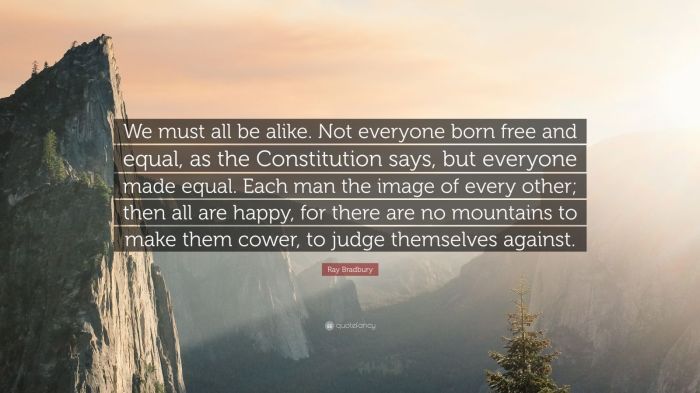
Fahrenheit 451employs a rich tapestry of symbols and motifs to explore the themes of conformity and individuality. These symbols and motifs permeate the novel’s narrative, contributing to its depth and complexity.
Fire
Fire serves as a multifaceted symbol in the novel. It represents both destruction and purification. The firemen, with their flamethrowers, embody the destructive power of fire, burning books and obliterating knowledge. Conversely, fire can also symbolize hope and renewal. Montag’s burning of his house at the end of the novel suggests a cathartic act of liberation and a potential for rebirth.
Water
Water is another significant symbol in Fahrenheit 451. It represents life, cleansing, and renewal. Montag’s encounters with water, such as his bath after burning the books, symbolize a purification of his soul and a rejection of the society’s oppressive values. The river that Montag and Faber escape to also represents a sanctuary, a place of refuge from the conformity of the outside world.
Nature
Nature is a recurring motif in Fahrenheit 451, symbolizing freedom and individuality. The natural world stands in stark contrast to the artificial and oppressive society depicted in the novel. Montag’s encounter with the dandelion and his fascination with the natural world symbolize his growing sense of individuality and his rejection of the societal norms that seek to suppress his true self.
Relevance to Contemporary Society
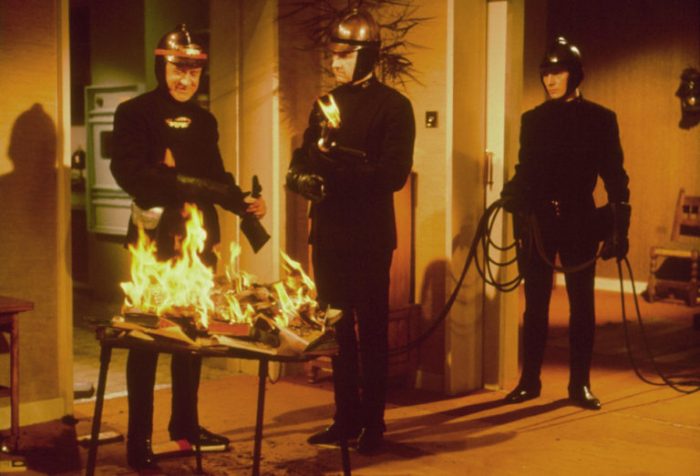
Fahrenheit 451 remains highly relevant to contemporary society, as it continues to grapple with the challenges of conformity and individuality in the face of rapid technological advancements.
Conformity and Individuality
In today’s world, social media and the internet have become powerful forces that can both foster and stifle individuality. While these platforms offer opportunities for self-expression and connection, they can also create pressure to conform to prevailing norms and expectations.
Fahrenheit 451’s message about the dangers of suppressing individuality is particularly resonant in the context of social media, where users may feel compelled to present an idealized version of themselves rather than their true selves. This can lead to a sense of alienation and a loss of authenticity.
The Role of Technology
Fahrenheit 451 also highlights the potential dangers of technology when it is used to control and manipulate information.
In the novel, the government uses the “Mechanical Hound” to hunt down and destroy books, effectively suppressing dissent and maintaining control over the population. While today’s technology is not as overtly oppressive, it can still be used to monitor and influence our thoughts and behaviors.
For example, social media algorithms can be designed to show us content that reinforces our existing beliefs and biases, creating “echo chambers” that limit our exposure to alternative perspectives.
The Power of Books
Despite the technological advancements of our time, books continue to play a vital role in preserving and transmitting knowledge and ideas.
In Fahrenheit 451, books are symbols of resistance and hope, representing the power of the human spirit to resist oppression and preserve individuality. In today’s society, books can still serve as a source of inspiration and enlightenment, challenging us to think critically and question the status quo.
Clarifying Questions
What is the significance of the quote “We must all be alike” in Fahrenheit 451?
The quote “We must all be alike” encapsulates the oppressive ideology of the dystopian society depicted in Fahrenheit 451. It reflects the government’s стремление to control and homogenize the population, eliminating any deviation from the norm.
How does Fahrenheit 451 explore the tension between individuality and the collective?
Fahrenheit 451 delves into the conflict between the desire for individuality and the pressures of conformity. The novel portrays the struggles of those who dare to think differently, highlighting the consequences of nonconformity in a society that values uniformity above all else.
What is the role of technology in promoting conformity in Fahrenheit 451?
Technology plays a crucial role in enforcing conformity in Fahrenheit 451. The “mechanical hound” and the “firemen” symbolize the oppressive nature of technology, used to suppress individuality and control society.
How do books serve as a source of resistance in Fahrenheit 451?
In Fahrenheit 451, books represent knowledge, critical thinking, and imagination, providing a source of resistance against the oppressive forces of conformity. The characters in the novel use books to maintain their sense of self and challenge the dominant ideology.
What are some of the major symbols and motifs in Fahrenheit 451?
Fahrenheit 451 is rich in symbolism and motifs, including fire, water, and nature. These elements contribute to the novel’s exploration of conformity and individuality, representing the struggle between oppression and freedom, and the enduring power of the human spirit.